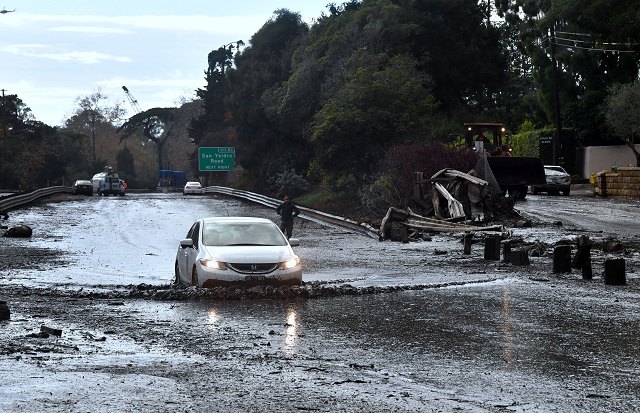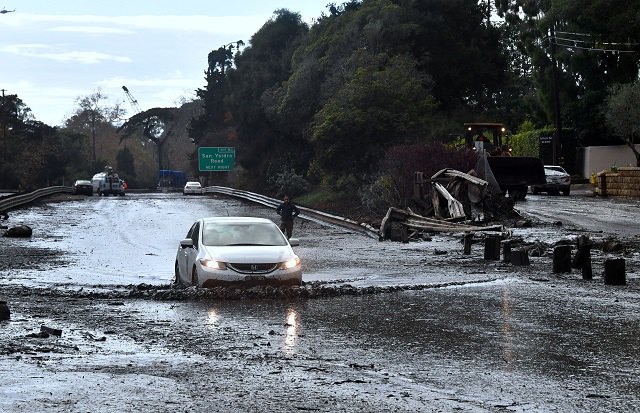
 A vehicle drives across a flooded US 101 freeway near the San Ysidro exit in Montecito, California on January 9, 2018. Mudslides unleashed by a ferocious storm demolished homes in southern California and killed at least 13 people, police said Tuesday. (Photo: FREDERIC J. BROWN / AFP / Getty Images)
A vehicle drives across a flooded US 101 freeway near the San Ysidro exit in Montecito, California on January 9, 2018. Mudslides unleashed by a ferocious storm demolished homes in southern California and killed at least 13 people, police said Tuesday. (Photo: FREDERIC J. BROWN / AFP / Getty Images)
Catastrophic floods have struck Southern California in areas already scorched by the largest wildfire in the state’s history. This week, flash floods and mudslides sent “boulders the size of trucks” careening through neighborhoods, according to Tom Fayram, who is deputy director for water resources with the Santa Barbara County Public Works Department. The death toll currently stands at 15, and there is every reason to suspect that number will continue to rise. Eight more are missing, and an astonishing 300 were trapped in Romero Canyon (Montecito), as knee-deep mud rendered roadways ineffective. At last count, 59 homes had been destroyed and another 446 damaged.
The Thomas Fires that scorched the area just weeks ago “cooked” the subsoil, weakening tree roots, loosening compacted earth and dislodging rocks, according to UCLA climate scientist Daniel Swain. This, he adds, made the slopes of Santa Barbara County especially susceptible to catastrophic mudslides. Once heavy rains sent this loose soil careening down into the suburbs of Montecito County (amongst others), fire hydrants were ruptured, sending thousands of gallons of extra water slushing into the flood stream, intensifying the existing floods while threatening to set off flash floods further downstream.
The utter chaos presently unfolding in Southern California is indicative of the chaotic nature of climate disasters in general. Once ecological thresholds are crossed, disasters set one another off like Chinese firecrackers or falling dominos. Chaos ensues, with unpredictable ruptures in the ecological system materializing along all fronts. This is why mitigating climate change now is so important. The closer we get to thresholds like the 2-degree Celsius mark, the closer we come to losing control over the climate to a “range of ‘natural’ feedbacks” engendering a self-propelled chain of crises.
Given the imperative to restrain anthropogenic climate change before humanity tumbles past the ecological thresholds that demarcate a habitable planet from oblivion, the dearth of mentions that anthropogenic climate change received as a possible cause of the Southern California floods in the mainstream press is remarkable. KTLA, USA Today, the Los Angeles Times, BBC, CNN, The Washington Post and HuffPost all fail to mention that human-caused climate change is very likely to have been a key factor in the Southern California floods. This is in spite of abundant scientific evidence to support such a claim.
Brenda Ekwurzel, senior climate scientist and director of climate science at the Union of Concerned Scientists, has explained that anthropogenic climate change warms the air, which causes it to retain more moisture, and eventually, to release that moisture as extraordinarily heavy rainfall — the kind that produces powerful mudslides like the ones seen in Southern California. Michael F. Wehner, senior scientist at Lawrence Berkeley National Laboratory, provides empirical data to support Ekwurzel’s claim. Anthropogenic climate change, he reported, increased Hurricane Harvey’s rainfall by 15 percent, which suggests that anthropogenic climate change also exacerbated rainfall in the case of the Southern California floods. The Tyndall Centre in the UK provides yet more evidence, stating “greenhouse gas emissions increased the risk of floods occurring in England and Wales in autumn 2000 by more than 20 percent, and in two out of three cases by more than 90 percent,” indicating that there are causal pathways linking anthropogenic greenhouse gas emissions to extreme flooding events like the one seen in Southern California.
Given the abundance of evidence suggesting that anthropogenic climate change may have had a major role to play in the Southern California floods, and the urgent need to curb anthropogenic climate change in the here and now, why hasn’t the mainstream media seen fit to mention anthropogenic climate change in its coverage of the Southern California floods? Political self-censorship is not beyond reason. Indeed, many US newspapers self-censored during the McCarthy era, as did many of the nation’s libraries, according to the famous Fiske Report. While McCarthyism is dead, more than half of the members from both the House and the Senate are climate deniers, to say nothing of Trump and his government appointees. Indeed, it appears that the National Oceanic and Atmospheric Administration (NOAA) report released on January 6, which revealed that 2017 was the costliest year of climate disasters in US history, was self-censored in that it neglected to mention even the possibility of anthropogenic climate change playing a decisive role in granting 2017 that dubious honor.
The urgency of scaling back anthropogenic climate change is immense. As the causal link between the Thomas Fire that stuck Southern California just weeks ago, and the floods plaguing the region today shows, climate disasters tend to set one another off and snowball into uncontrollable chains of crises. Thus, it is of the utmost importance that anthropogenic climate change be mitigated in the here and now, before ecological thresholds are crossed and crisis chains begin to unfold. Every contemporary climate disaster, therefore, constitutes a valuable opportunity to disseminate awareness of both, the destructive capabilities of anthropogenic climate change and the imperative to rein it in. In spite of this, and the mountain of evidence suggesting that anthropogenic climate change may have been a major factor in engendering Southern California’s catastrophic floods, mainstream media outlets have failed to emphasize that point to any appreciable degree. While objectivity is indispensable, a press that is timid on anthropogenic climate change may fail to disseminate climate awareness sufficiently, such that, as the late economist Paul Sweezy wrote in a Monthly Review article entitled “Socialism and Ecology,” “so much time will have been lost that it may be too late for civilized humanity to restore the necessary conditions for its own survival.”
Join us in defending the truth before it’s too late
The future of independent journalism is uncertain, and the consequences of losing it are too grave to ignore. To ensure Truthout remains safe, strong, and free, we need to raise $33,000 in the next 2 days. Every dollar raised goes directly toward the costs of producing news you can trust.
Please give what you can — because by supporting us with a tax-deductible donation, you’re not just preserving a source of news, you’re helping to safeguard what’s left of our democracy.